Outreachy report: March 2025
Highlights
- I traveled to Berlin to attend several meetings with Outreachy community members and FOSS Backstage 2025. I gave a talk titled “Anatomy of an open internship program: How we run Outreachy”, which you can now watch on YouTube.
- I traveled to São Paulo to attend DISC Unconference 2025, where I led in-person and online discussion groups for our Open Mentorship Initiative. Outcomes of that weekend can be read here.
Description of activities
I left Brazil early in the month to spend a couple of days in Berlin before FOSS Backstage 2025, and that decision was proved right over and over again—not only it allowed me to meet with several Outreachy community members, but with news of strikes in German airports, arriving the day of the event would’ve been a catastrophic choice.
My meetings included a lot of private, sensitive conversations with our community, and it isn’t my place to divulge them. What I can say is that although I’m very familiar with the majority of 1,000+ stories of Outreachy alums—and many more of mentors and coordinators of the program—, it’s a completely different experience to hear them in person. The warmth of their presence and the happiness in their voice reminded me, once more, of why we’re so dedicated to our program’s mission.
I find that it’s one thing to experience the liminality of the program yourself, and a completely different thing to watch others go through it. As of 2025, Outreachy is in a different place than it was when I was selected to the program: the initial application process and contribution period are completely different phases of the application process; internships are more structured, and our organization has established itself as one with a high touch philosophy. Sometimes I wonder what kind of person I’d have become if I had experienced Outreachy in its current form; maybe some of current struggles wouldn’t exist (though I’m sure many others would appear). But to me it is obvious that I’ve brought it to a state it’s significantly better than how I found it, and I’m very proud of I’ve accomplished in the last 6 years and a half.
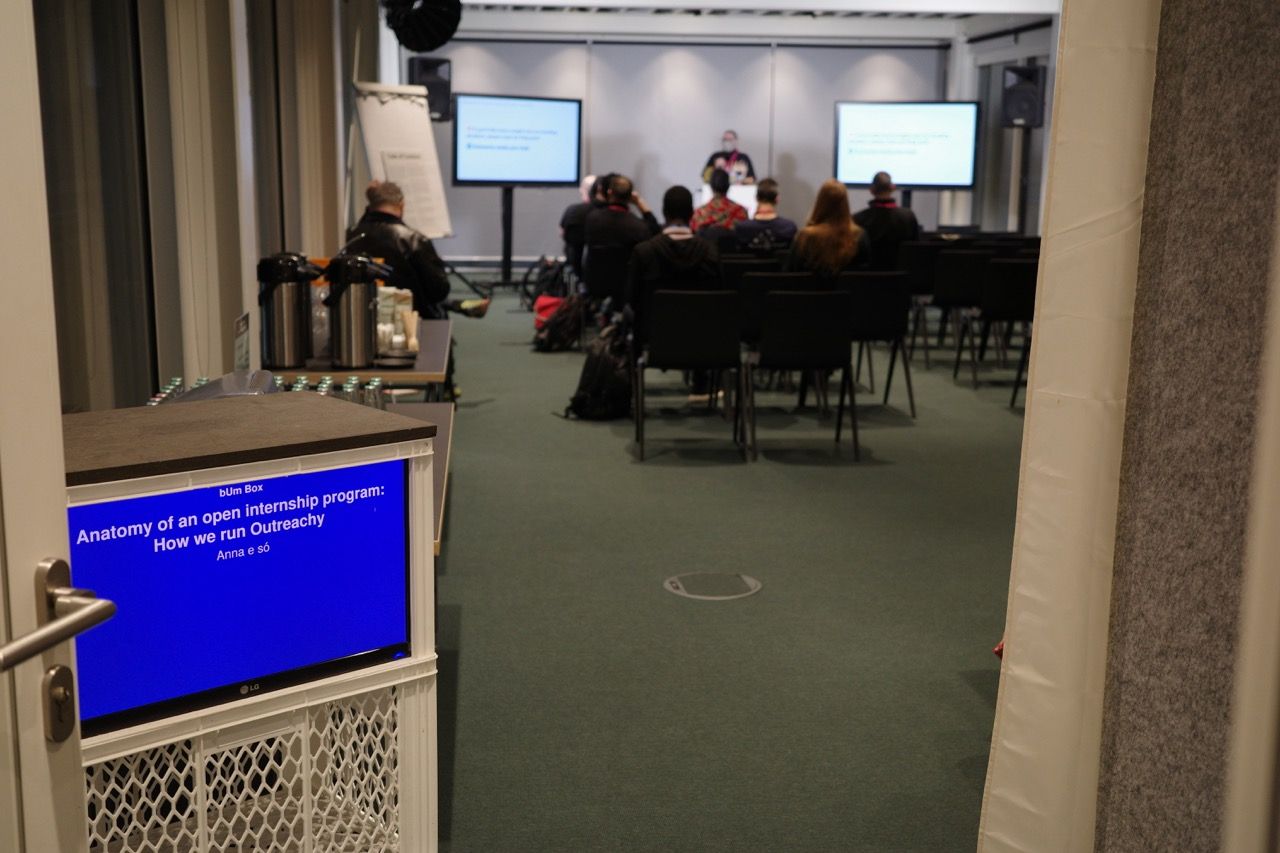
Accomplishment: that was one of themes of my talk. But that came with a call for help. In several conversations I had at FOSS Backstage 2025, attendees appeared to be surprised to learn about our current budget challenges—I would frequently hear the phrase “but Outreachy has always been there!” as the other side of the conversation slowly worked through the realization that they’ve taken the continuation of the program for granted. How many times have we made the assumption that others had it all sorted out, only to find that they needed our help?
My mission this year is to keep bringing Outreachy to light. “Outreachy is a hidden dependency of the free software ecosystem”, I argued in Berlin. “The new generation of FOSS contributors, activists and leaders is already here. Outreachy has trained them.” As I listed several of the ingredients that makes our program so special and so loved, I made it very clear: losing us is taking several steps back in the free and open source ecosystem—it’s closing doors for the Global Majority.
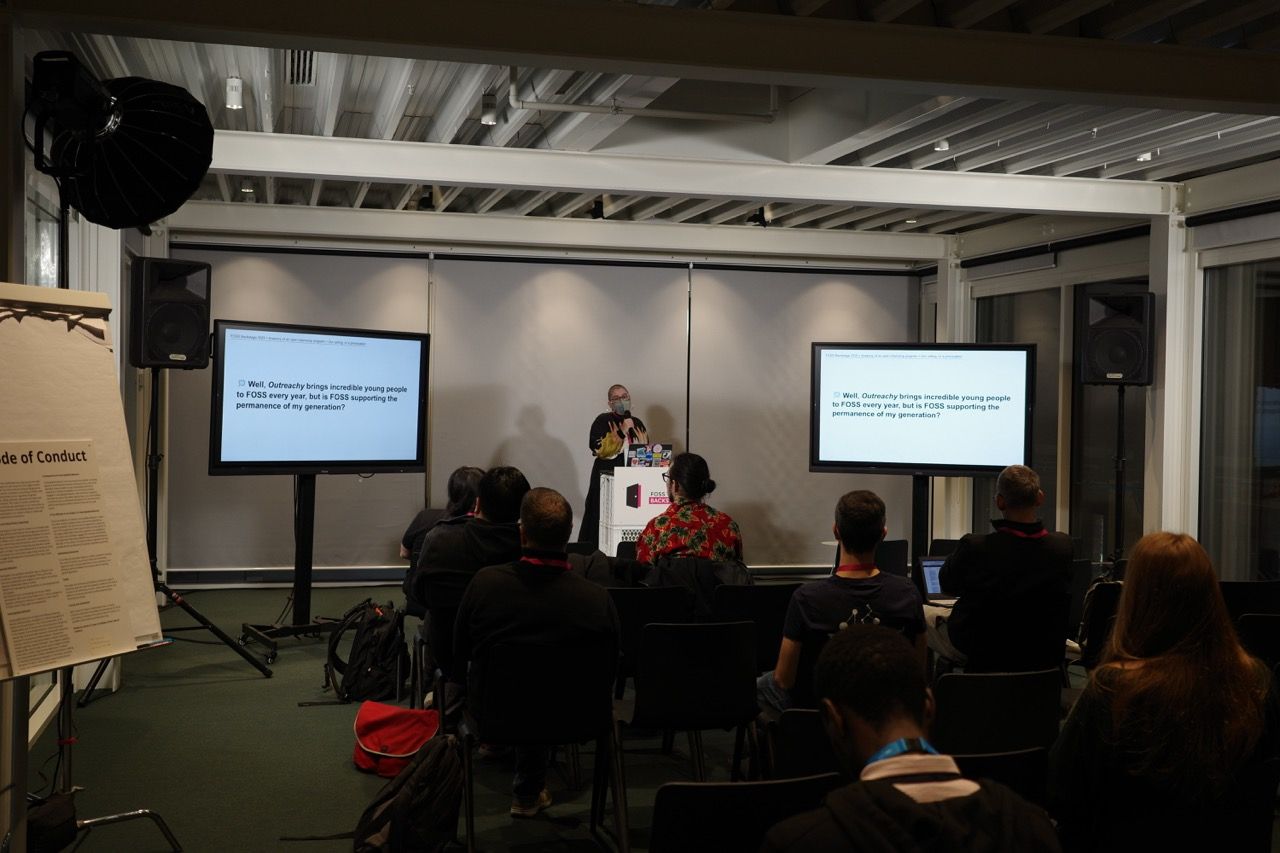
I’d like to highlight the following talks:
- Ijeoma Onwuka and Maryblessing Okolie talked about tokenism in open source, and I think our talks go together really well;
- Andrea Kao—an Outreachy alum—gave an incredible talk about documentation I think everyone should watch;
- Jarek Potiuk talked about dependency security, an outstanding effort that deserves your attention;
- Jory Burson and Florian Scholz shared interesting insights on the project economics of Open Web Docs which has given me a lot of food for thought!
In São Paulo, conversations at DISC Unconference 2025 were held online and in-person. I was blessed with the presence of several open mentorship program organizers, and which one offered a rich insight into their challenges, pain points, successes, and victories. For the in-person track, I’d like to thank Ana Ruvalcaba, Kweyakie Afi Blebo, Yani Bellini, and Arliss Collins for the wonderful conversations and expositions. For the online track, I’d like to thank Aditi Juneja, Yashasvi Misra, Deborah (Debs) Udoh, Harmony Elendu, Julius Boakye, David Chapuis, Ijeoma Onwuka, and Ariane Djeupang for bringing rich perspectives and beautiful testimonies.
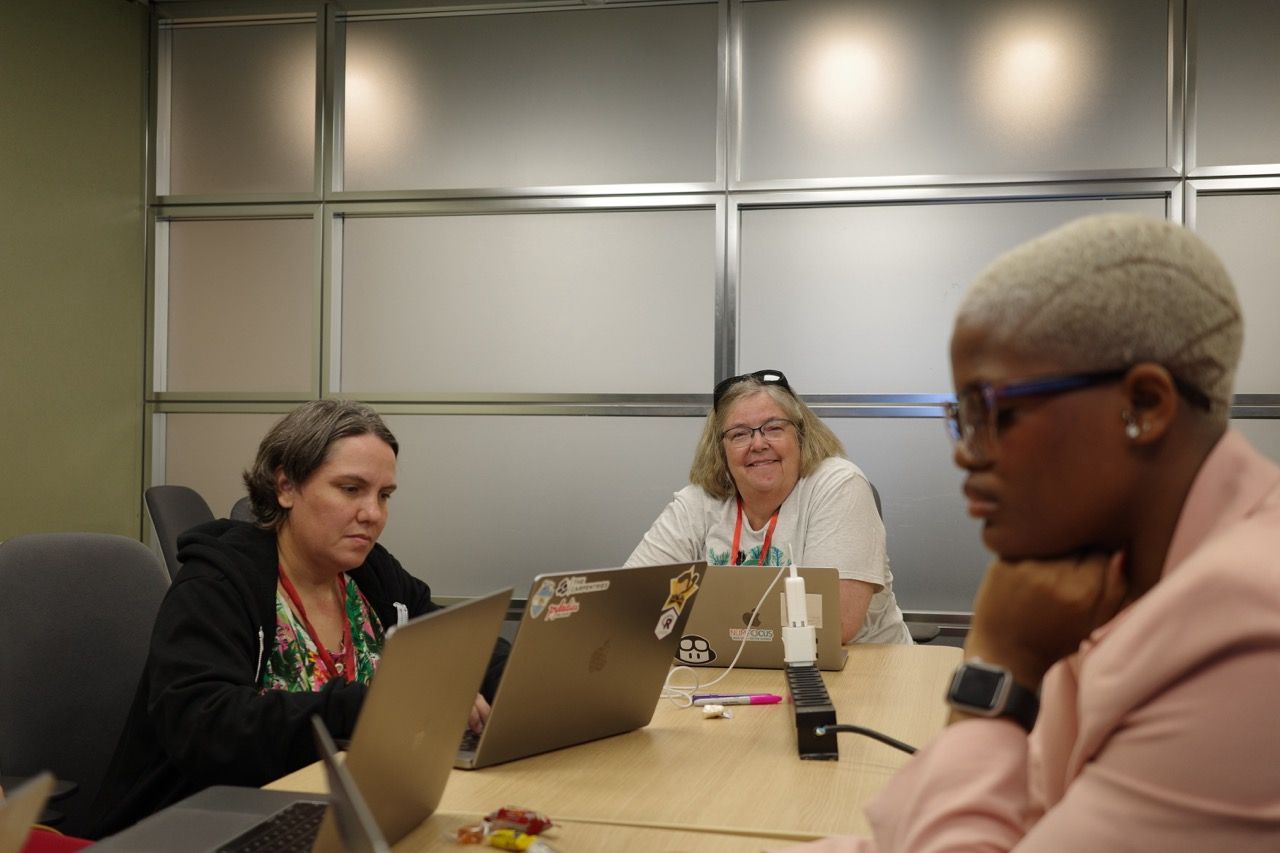
My wonderful fellow organizer, Omotola Omotayo, helped me facilitate the in-person track—and we had a wonderful time together! Our fellow organizer Sage Sharp couldn’t make it to Brazil, but they were instrumental in the organization of the virtual track. I hope for a time we’ll be able to meet in person again.
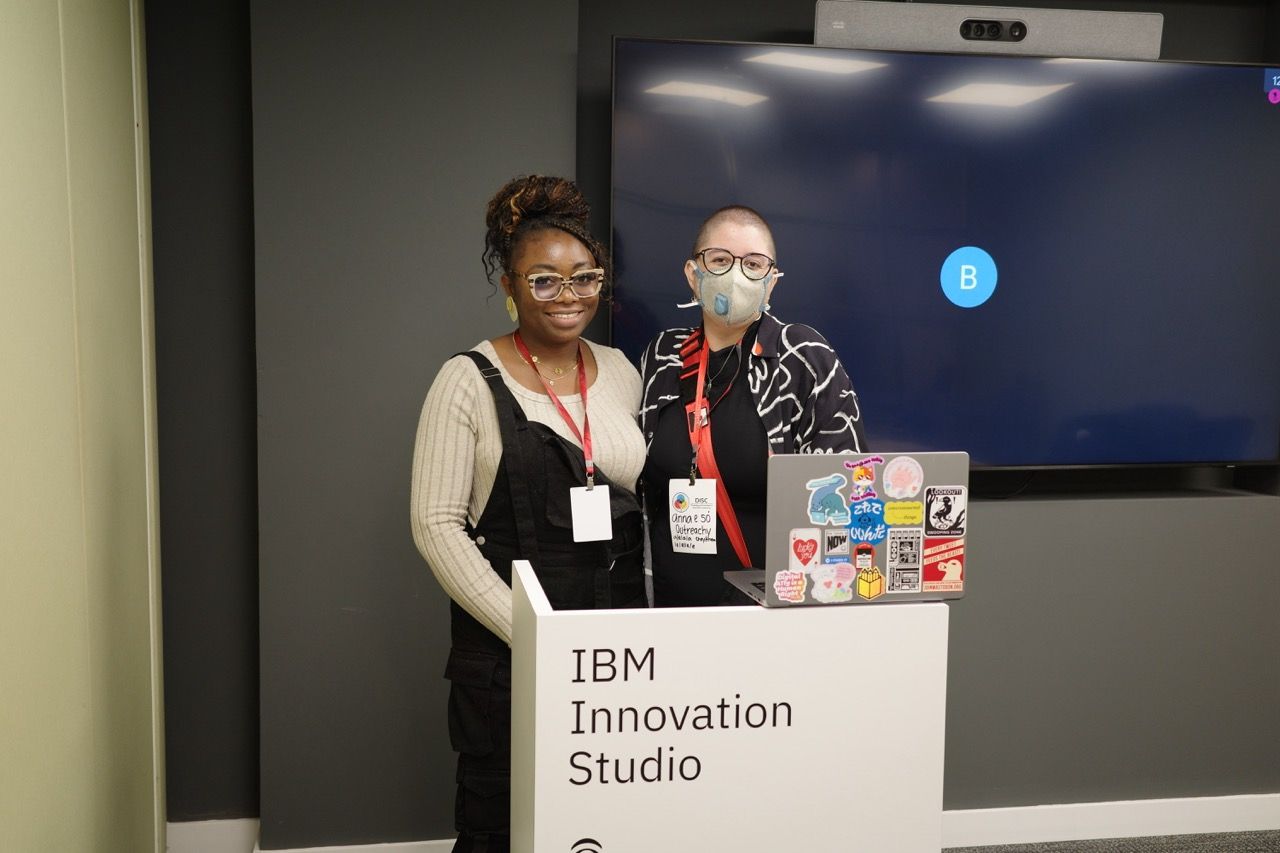
A lot of our conversations were focused on the facilitation devices and efforts created and maintained by program organizers. It’s clear to me that we ought to document frameworks of thinking rather than prescriptive approaches; in that, we can create a taxonomy of open mentorship efforts, and assist communities in our ecosystem in making informed decisions.
That strategy was validated by several people over the last 3 weeks, and I saw a lot of relief in the certainty that someone will champion not only mentors or mentees, but program collaborators and organizers too. This can be a very lonely trade, and it’s my goal to create a place in the free and open source ecosystem that will become a safe, welcoming space for all.
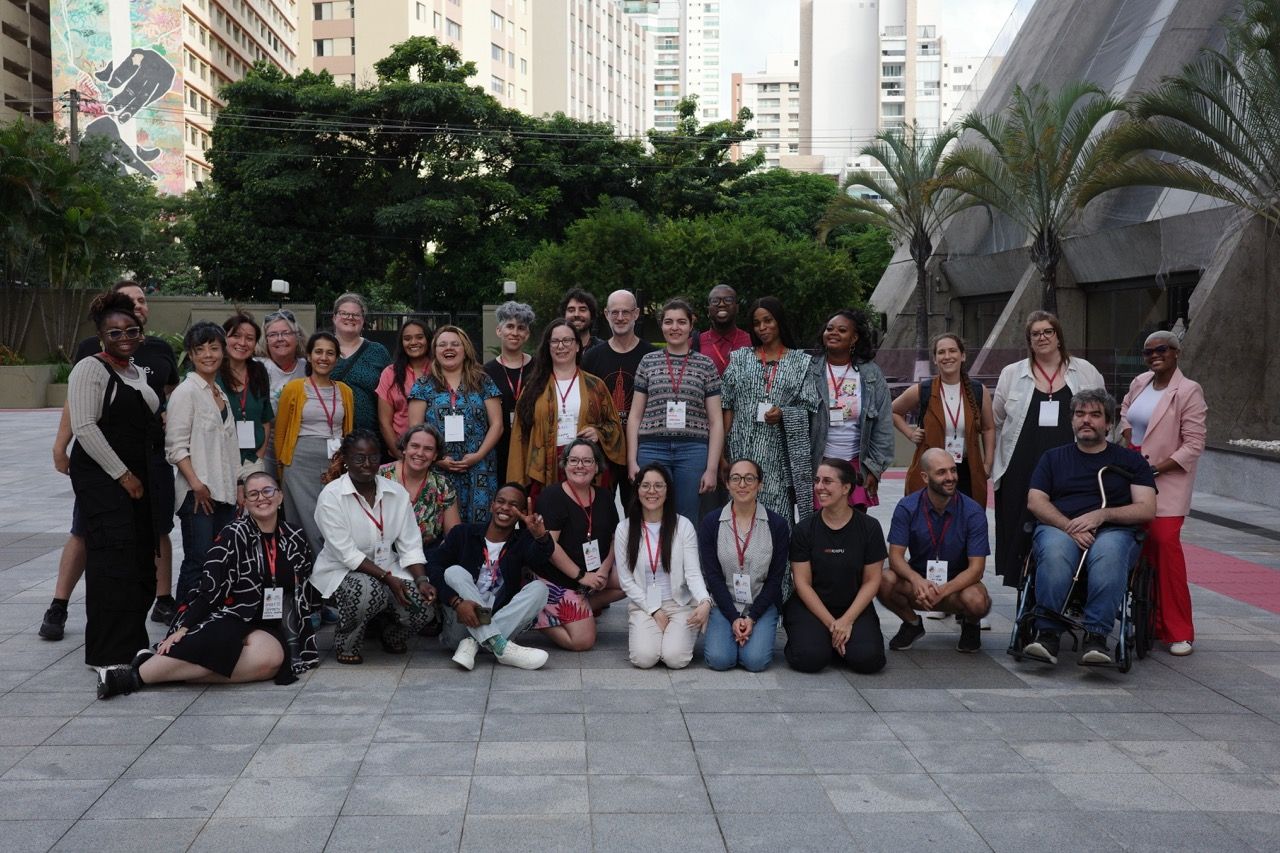
Challenges
- I had to convert our exclusively in-person project to a hybrid project in the face of Sage Sharp’s sickness, and that required some experimentation on the fly. Ana Ruvalcaba, in particular, was an incredible facilitator that kept us grounded as we all conversed online and offline.
Lessons learned
- In the context of hybrid events such as FOSS Backstage and DISC Unconference, my contributions should take into consideration both types of participation. I had limited experience with merging in-person and online tracks—the last time I did so was at a Chan Zuckerberg Initiative meeting in Argentina—, and this experience exposed some difficulties I have to take into account next time. My remedies include attending such events with a dynamic including all types of participants in mind, establishing lines of communication, scheduled times for check-in, and appointing a co-lead or a supporter on the other track to make sure everything works out.
Upcoming activities
It took me a while to readjust to my usual routine in my home base In Goiânia, but I’m finally up to date with the latest Outreachy matters. For the first half of April, my focus is both our strategic planning for this fiscal year and a grant proposal for our Open Mentorship Initiative—such goals are complementary in nature, intrinsically interwoven. My secondary goal is to continue the work on revamping our feedback submission system with the assistance of Tilda Udufo.
Lastly, I was invited by a university professor to give a talk to freshman students about getting involved with free and open source software. That talk will take place next Wednesday, April 2.